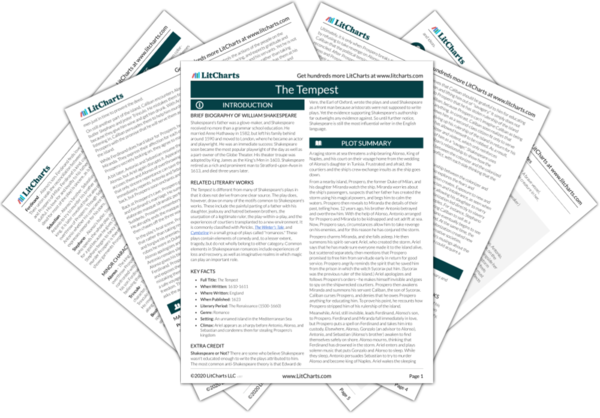Magic in 'The Tempest'
How does Shakespeare use magic in 'The Tempest?'
John William Waterhouse / Wikimedia Commons / Public Domain
- Shakespeare's Life and World
- Best Sellers
- Classic Literature
- Plays & Drama
- Short Stories
- Children's Books
- M.A., Theater Studies, Warwick University
- B.A., Drama and English, DeMontfort University
Shakespeare draws heavily on magic in "The Tempest"—indeed, it is often described as the writer’s most magical play. Beyond plot points and themes, even the language in this play is particularly magical.
As a major theme, magic in " The Tempest " takes many different forms and is used to achieve a number of goals throughout the play.

Prospero’s Magic
It’s clear from the start that Prospero is the powerful character in “The Tempest,” and that is because of his magic. The play opens with a theatrical demonstration of his abilities, and as we are introduced to other characters on the island, we learn that Prospero has used his magic as a way of establishing himself as a kind of ruler. Throughout the play, it is his spells and schemes that drive the overall plot.
However, Prospero’s magic in “The Tempest” is not so simple as an indication of power. It was exactly Prospero’s eager pursuit of magical knowledge that gave his brother the opportunity to usurp him, taking away his power by taking his title. And as Prospero returns to Milan at the end of the play, he renounces the magic that has both given and taken away his power.
Thus, magic is what complicates the character of Prospero. While it gives him some control, that power is false and misleading in the way that it leaves him weakest in the places that matter most.
Mystical Noises and Magical Music
Shakespeare often uses noises and music to create a magical tone for scenes for both characters and readers. The play opens with the deafening noise of thunder and lightning, creating anticipation for what is to come and displaying Prospero's powers. Meanwhile, the splitting ship inspires a “confused noise within." The island itself, Caliban observes, "is full of noises," and the combination of mysterious music and sounds there paints it as a mystical place.
Music is also the most frequent demonstration of magic in "The Tempest," with Ariel constantly using it as a tool for manipulating the group of lords. By practically seducing them with sound, he is able to split them up and lead them to different places on the island, helping Prospero achieve his goals.
The Tempest
We know that the magical tempest that starts the play represents Prospero’s power . However, it also gives insight into his character. Through the storm, we see both vengeance and violence in Prospero. He sees an opportunity to both escape the island and exact some revenge on his brother, and he takes it, even if that means conjuring a dangerous storm.
In an empathetic reading of Prospero, the tempest can also be a symbol of his internal pain, brought on by his brother Antonio. The feelings of betrayal and abandonment that make up Prospero's own emotional turmoil are reflected in the tumultuous thunder and lightning that ultimately take down the ship. In this way, Prospero's magic is used as a means of depicting his humanity.
- Quotes From Shakespeare's 'The Tempest'
- 'The Tempest' Overview
- 'The Tempest' Summary for Students
- Overview of Shakespeare's 'The Tempest'
- Prospero: Character Analysis of Shakespeare's 'Tempest' Protagonist
- "The Tempest" Act 1
- Analyzing Shakespeare's 'The Tempest'
- Power Relationships in "The Tempest"
- 'The Tempest' Quotes Explained
- 'The Tempest' Themes, Symbols, and Literary Devices
- 'The Tempest' Characters: Description and Analysis
- 'The Tempest' Summary
- Understanding Ariel in "The Tempest"
- The Role of Caliban in 'The Tempest'
- Top 5 Female Villains in Shakespeare Plays
- Disguise in Shakespeare
Exploratory Shakespeare
English 15 summer 2015.

Magic in The Tempest
Magic is not a frequently discussed topic, outside of eccentric video gamers and the handful of trading card enthusiasts. It is certainly not a topic one would expect any sort of scholarly article to take on seriously. However, that is exactly what Barbara Mowat, the director of research at the Folger Shakespeare library does. In her 33-page essay called Prospero’s Book , she acknowledges precisely what there has been “so little curiosity about” (4) in Shakespeare’s The Tempest .
The essay opens with the assumption that Prospero does indeed have a magic book, which is essential to his magic. She does an adamant job in her essay providing evidence for the existence of the book, but as with most things Shakespeare, it is not indisputable. The quote “I’ll to my book, / For yet ere suppertime must I perform / Much business” (3.1.113-115) is the foundation which validates her argument and interests her audience. It acknowledges that spirit magic has an obvious existence in the book, being his ‘business’ and connects it to his book. She states that further examples exist in The Tempest and are crucial to Prospero’s control of the island, but she will not make an argument solely based on textual evidence from Shakespeare.
Her argument is augmented by the fact that audiences assumed that Prospero had a magical book until the twentieth century, and because substantial research has been done on the grimoires of early modern conjurors and why the population of the time believed in them. She then transitions to the next part of her paper, which addresses why there is so little criticism on the topic of Prospero’s wizardly items (his robes, his staff and his book). Her belief is that, as civilization started approaching what it is today, people had more and more difficulty taking magic seriously. Magic is not real, and so it was ignored. She then quotes Kieth Thomas, who wrote a book on the decline of magic, and credits him, and scholars like him, with the renewed interest in Prospero’s book. His studies on historic grimoires raise a multitude of questions, like if Prospero’s book exists, what is in it. To answer that question, Mowat proposes the exploration of “real… books of magic” (3).
These books, or grimoires, as she refers to them, are fluid in content and anonymously authored, but have many similarities. It is certainly curious that they all have religious inflections, and nearly all of them are dedicated to the materials, instructions and language involved with calling spirits, leaving no room at all for the purpose the spirits are called for. She then focuses on two specific books, Book 15 of Reginald Scot’s The discourie of witchcraft , and Folger MS Vb26. After describing the content of these two books she discusses the populations attitude towards them.
She then sets up the relation of the grimoires she’s studied to Shakespeare’s play. She claims Prospero’s book “both is and is not a grimoire” (25). I falls in line with the accepted categories of magic that critics associate with Prospero, making it seem like one of the magical books she discusses earlier, but is not because all of the books she has studied describe spirits with the utmost reverence and fear, while Prospero addresses Ariel blithely, creating a disconnect with the other magic books of the time.
Mowat concludes with reiterations of the points she’s made throughout her essay, but not asserting much, outside of the existence of the book. She leaves the reader with and open ended statement acknowledging that many of the questions she’s raised in her essay will remain unanswered until more is learned about ancient grimoires.

Back to: The Tempest by William Shakespeare
In the play The Tempest, the protagonist Prospero practices magic. Much like the character of Doctor Faustus by Marlowe , Prospero has a sincere craving for knowledge.
He was a duke of Milan until Antonio, his brother usurped him and with his daughter Miranda, he was exiled and finally, he arrived on this unnamed island.
On the island, Prospero practices magic. Island as a space away from the mainland offers a perfect location to reach the limit of anything. In the very beginning, the reader gets to know that the storm which wrecked the ship of Alonso is created by the magical power of Prospero.
The moment Prospero hints at the character of Caliban, one notices Shakespeare’s attempt to show both sides of magic. Prospero’s magic is a kind of “ white magic ” whereas Sycorax, the mother of Caliban practiced black magic which is evil in nature.
By addressing Sycorax as a witch, we are reminded of the prevalent ideas regarding witchcraft in that age when magic was seriously pursued by many.
The character of Ariel which is described as “ airy ” in nature is an extension of Prospero’s magical power. His utilization is realistic in nature.
Prospero is a good magician who is shown by the fact that he uses Ariel to fulfill good things or to restore justice i.e. Prospero’s dukedom but Sycorax had confined him in a tree from which Prospero freed him.
Prospero has been on the island for almost twelve years. He makes a precise blueprint to take his revenge and that also in a fruitful manner.
Using magic, he washes them ashore and the survivors are grouped as per his plan. Ferdinand becomes the tool for his political ambition.
Under the magical spell, both Miranda and Ferdinand fall in love and commit instantly. The whole plot advances under the spell of Prospero, he is the designer of the whole thing, a complete artist, magic his art.
As a finest show of his magic, Prospero creates a masque to teach the newly betrothed ones the morality of their age regarding chastity. He uses magic for real cause like he creates a political bond by giving his daughter in marriage to Ferdinand, the Prince of Naples.
Towards the end of the play, Prospero shows the extent of his magic. He says that “ grave at his command have waked their sleepers, op’d, and let’em forth .”
In the end, there is a reversal of conditions. Prospero decides to abandon all his magical power. In his attempt to cherish human condition, he decides to “ drown his book ” in the depth of the earth. The play’s epilogue bares open ‘behind the scenes’ of magic and suggests the value of being simply a mortal being.

Website navigation
Teller and the tempest: magic in shakespeare's time.
Esther French

Prospero (Larry Yando) suspends his daughter Miranda (Eva Louise Balistreiri) in midair as the ever-watchful Ariel (Nate Dendy) assists his master in Chicago Shakespeare Theater’s production of The Tempest , directed by Aaron Posner and Teller, in the Courtyard Theater, 2015. Photo by Liz Lauren.
In Shakespeare’s The Tempest , the magician Prospero conjures up a storm, charms his daughter to sleep, and uses his power to control Ariel and other spirits. Is this magic for real, or is Prospero pulling off elaborate illusions?
Fascinated by this question and by Prospero’s relinquishing of magic at the play’s end, Teller (of the magic/comedy team Penn & Teller) co-directed a production of The Tempest with Aaron Posner at Chicago Shakespeare Theater in 2015. (Teller and Posner had previously worked together on the 2008 Folger Theatre production of Macbeth .)
In this episode of Shakespeare Unlimited , Teller joins Barbara Mowat, co-editor of the Folger Editions, to talk about magic in The Tempest and other Shakespeare plays, as well as the attitudes about magic that Shakespeare would have encountered in late sixteenth- and early seventeenth-century England.
Listen on iTunes
[soundcloud url=”https://api.soundcloud.com/tracks/250908282″ params=”color=ff5500&auto_play=false&hide_related=false&show_comments=true&show_user=true&show_reposts=false” width=”100%” height=”166″ iframe=”true” /]
Shakespeare’s contemporaries would have taken the supernatural world for granted.
“They lived in a world where people believed firmly that there were hierarchies of angels and hierarchies of fallen angels, and to deny that was to be accused of being an atheist,” Mowat says.
The discovery of witchcraft , a 1584 book by Reginald Scot, argued that human beings could not summon or control spirits. But no less a figure than James I, who ascended the English throne in 1603, wrote his own book advocating the opposite position—that human beings did indeed exercise power over spirits—and attributing the source of that power to the devil.

Shakespeare was taking a risk with the use of magic in The Tempest , which was first performed in 1611; he could have landed himself in prison or worse. However, according to Mowat, Shakespeare protected himself by removing any religious context and by having Prospero give up magic at the end of the play .
But this rough magic I here abjure, and when I have required Some heavenly music, which even now I do, To work mine end upon their senses that This airy charm is for, I’ll break my staff, Bury it certain fathoms in the earth, And deeper than did ever plummet sound I’ll drown my book.
In an article Mowat wrote for Shakespeare Quarterly in 2001, she argues that Prospero’s book would have been what’s known as a grimoire, a book that a magician would use to summon spirits. These books were collections of prayers and invocations, with names and descriptions of the fallen angels that could be summoned, according to Mowat.
The images below are from the 1580 grimoire mentioned in the podcast episode:

Listen to the podcast episode to learn more about Shakespeare and magic.
Chicago Shakespeare Theater is a theater partner of the Folger Shakespeare Library.
Esther French is the Digital Managing Editor at the Folger Shakespeare Library. — View all posts by Esther French

Stay connected
Enter your email address to follow this blog and receive notifications of new posts by email.
It would be so much more convenient if there were a transcript.
Margaret Secara — March 12, 2016
I hope I can see this someday.
I like the take on this. I wish they had also discussed that what we know as illusions are how stage effects were created in Shakespeare’s day.
It got to the point that audiences became jaded and some theatres would post notices that said “no jugglers tricks used”.
Still a great podcast.
Joe — March 13, 2016
When I read The Tempest, I came to see it as a commentary on the religious events of the day. Prospero, might signify the Pope who was losing some authority as the Reformation took hold. Towards the end of the play, he buries the book and wand, which might be a metaphor for the Bible and cross. There are other allusions but these stand out to me.
David Calhoun — February 10, 2020
Find out what’s on, read our latest stories, and learn how you can get involved.
Essay Sample: The Importance of Magic in The Tempest
In William Shakespere’s The Tempest,, Propero lives a complicated life, and his connection to his art is one of the many distractions in his daily life. The Duke of Milan has to persevere through hardships while simultaneously dealing with enemies, being a father, and being stuck on an island. Throughout the play, Prospero is in constant conflict between his magic and his values. Prospero’s books not only possess magical power, but have the ability to control his life. In order to maintain a healthy mindset, Prospero must realize that he needs to drop his magic due to the enormity of the magic’s strength and how it interferes with his priorities.
Due to the magical power the books hold, along with the power that those same books hold over the life of Prospero, he must realize that he needs to drop his magic due to the enormity of the strength and how it interferes with his priorities.
Throughout the Tempest, Prospero uses the magical power that his books hold in order to perform extreme, unbelievable and extroinirardy acts. His books can do a lot more than the normal magical acts that are constantly put on in society. For example during the play we see Prospero use his magic to create a big storm, destroy/manipulate his enemies and to set up a wedding with his daughter and the king of Naples. In Act 1 Scene 2, when Miranda is talking to Prospero about life and the storm, she says “Heavens thank you for it, And now I pray for you sir for still tis beating in my mind, your reason for raising this sea storm.” This quote shows that not only do Prospero's books indeed have the power and ability needed to create a storm that has the magnitude to kill thousands of people, they also have the power to inflict damage that should not be taken lightly. Another quote which shows the magical power of the magic is when Prospero says
While Prospero has a very important job as being the Duke of Milan, throughout the Tempest, he displays more care and more dedication towards his books above his prized job as the Duke of Milan. Although the books have the potential to inflict damage to his life, the power that the books hold in Prospero’s life inflict greater damage to him. Another example of Prospero's addiction to magic in his life, and the magic taking power over him is when we first see evidence of Prospero addiction is in Act 1.2.77. In this scene Prospero is explaining to his daughter Miranda the reasons as to how he lost his dukedom. Prospero says, “The government I cast upon my brother And to my state grew stranger, being transported And rapt in secret studies.” In this quote Prosepro is talking about his “secret studies” which most likely mean his magic. While he does put some of the blame on his brother for the loss of his dukedom, he admits that he cared more about his “secret magic” than he did about controlling and leading Milan. Another example of Prospero's art having an impact on his life is when he is talking to Miranda about how they survived the terrible storm, and displays his priority, love, and dedication towards the books. Prospero says, “Knowing I’d lov’d my books, he furnish me From mine own library with volumes that I prize above my dukedom.” This quote proves that Prospero’s obsession with the books is harmful. The fact that Prospero is dedicating himself and his time towards caring about his magical books then his important job as a duke shows that he needs to drop his magic in order to maintain a focused mindset. If Prospero were to set all of his time towards his magic, he would have none for caring for the people of Milan.
Due to Prospero's magic having a powerfully negative impact on his life, and not having his priorities straight, he realizes that he needs to let go of his magic in order to maintain a healthy mindset. Not only did the magic have a negative impact on his life, it took a toll on Prospero's strength to the point where he had nothing beside (save this for leora)
Prospero has the realization that he does not need to enforce his power and his magic in order to torutre and manipulate his enemies but approach them with a kinder manner. In act 5.1.25-28, while talking to Ariel in his magic robes, Prospero says, “Though with their high wrongs I am struck to th’ quick, yet with my nobler reason against my fury do I take part. The rarer action is in virtue than in Vengeance.” This quote shows that Prospero is realizing that he is taking advantage of his books and using the books in a way that they should not be utilized. Prospero knows that he could be a better person if he were to drop his magic and treat his enemies with kindness instead of manipulating them, torturing them and using his books in a poor way.
Related Samples
- Gertrude Character Analysis in Hamlet Literature Essay Example
- Ophelia's Obedience in Hamlet Literature Essay Example
- Everyman Play Analysis
- Adolescents In Romeo And Juliet Essay Example
- Macbeth Tragic Hero Argumentative Essay Example
- Hamlet's Melancholy and Depression Essay Example
- The Consequences Of Romeo And Juliet Essay Example
- Hamlet As Seen Through The Feminist Critical Lens
- Hysteria in The Crucible Essay Sample
- Importance of Stories in Shakespeare's Hamlet and Thomas King’s The Truth About Stories Essay Example
Didn't find the perfect sample?

You can order a custom paper by our expert writers
The Tempest Themes
Shakespeare tends to focus on very specific issues in each of his masterpieces. In The Tempest , the themes of power and magic are the dominant ones. However, a little bit of attention is also drawn to the topic of colonization .
Our specialists will write a custom essay specially for you!
Looking for The Tempest themes? Find them all described here! This article prepared by Custom-Writing.org experts contains descriptions and analysis of the key themes in The Tempest . If you wish to dive deeper into the world of this play and understand the underlying issues, this section is for you!

- ⛓️ Colonialism
🔗 References
💪 power in the tempest.
It seems like almost every scene goes back to the questions about power in The Tempest . Even in the opening scene, the audience has the pleasure of observing the boatswain commanding the royal party, who are the passengers. Moreover, an exciting aspect of this play is that power is taken by force in most cases. As it would be anticipated, it leads to even more instability in the relationships and the vicious cycle of desiring even more. One of the best examples is how Antonio and Alonso betray Prospero. It is an immensely political problem, which yet shows that no illegal manipulation with authority can be left in the past. Later on, it leads to Antonio wishing for more power and attempting to murder the king. At the same time, the audience sees that this time his attempt fails. Therefore, it proves that violence is not a universally successful tool when it comes to gaining power.
Another relationship based on gaining power in The Tempest is Prospero and Caliban. After Prospero takes over the island with magic, Caliban swears for revenge and wants his rights and freedom back. However, the culmination of this theme in The Tempest appears to be the moment when the main character decides not to keep going with the vicious cycle. The fact that Prospero refused to seek revenge on Antonio influenced other a lot. They all come to peace and understanding at the end. Shakespeare’s main message regarding this theme is that compromise and forgiveness are a much better tool for settling things down than violence.
The Tempest Quotes about Power
Had I been any god of power, I would Have sunk the sea within the earth or ere It should the good ship so have swallow’d and The fraughting souls within her. The Tempest act 1, scene 2
I must obey: his art is of such power, It would control my dam’s god, Setebos, and make a vassal of him. The Tempest act 1, scene 2
His mother was a witch, and one so strong That could control the moon, make flows and ebbs, And deal in her command without her power. The Tempest act 5, scene 2
💫 Magic in The Tempest
In The Tempest , magic is one of the main themes. Supernatural elements are not uncommon in Shakespeare’s works , but this piece is full of magic manipulations. Prospero is the character who applies magic almost all the time. The first scene begins with him using it, and the play ends with him using it for the last time. However, it should be noted that a lot of times, he puts on illusions that do not harm his enemies except for psychologically related troubles. At the same time, Prospero possesses almost total control over the events and people on the island. Thanks to the spirit, he knows what is happening everywhere and can think through his next moves.
There is a certain resemblance between the way Prospero alters reality with magic in The Tempest and how the author does the same with words. Many times, Prospero is found peaking from the hiding at some of the scenes, just like the director manages the action. This is quite symbolic , and there have been a lot of assumptions made about these kinds of comparisons. One of the suggestions is that Prospero appears on the scene of the play as Shakespeare himself . It makes sense if we look into the last part of this literary piece. In the epilogue, Prospero asks the audience to set him free by applauding. It wouldn’t be so significant if this play wasn’t one of the last ones that Shakespeare wrote. Such an epilogue might be the way of saying goodbye to the theater. Therefore, as one of the main themes of The Tempest , magic has interpretations.
Just in 1 hour! We will write you a plagiarism-free paper in hardly more than 1 hour
The Tempest Quotes about Magic
My master through his art foresees the danger That you, his friend, are in; and sends me forth– For else his project dies–to keep them living. The Tempest act 2, scene 1
But this rough magic I here abjure, and, when I have required Some heavenly music, which even now I do, To work mine end upon their senses that This airy charm is for, I’ll break my staff, Bury it certain fathoms in the earth, And deeper than did ever plummet sound I’ll drown my book. The Tempest act 5, scene 1
Now my charms are all o’erthrown, And what strength I have’s mine own, Which is most faint: now, ’tis true, I must be here confined by you The Tempest Epilogue
⛓️ Colonialism in The Tempest
Colonization in The Tempest appears to be quite a fascinating subject. At least it was exciting for the readers during the time when the play was written. The attempts of colonizing distant lands attracted a lot of attention. In The Tempest , colonialism as a theme is opened up through the complex relationships between Prospero and Caliban. Prospero sees an uneducated islander as less of a human than himself and expects him to be grateful for teaching. However, it has never occurred to him that Caliban might be the rightful ruler of the island because such a savage cannot possibly perform such a complicated role. In return, Caliban understands that Prospero doesn’t respect him at all and traits him as a slave. Finally, it leads the islander to realize that he gave up the ruler’s position for nothing. Naturally, such an unfair situation evokes anger and violence in Caliban, making Prospero even more convinced in the savage nature of his protégé. It perfectly illustrates the relationship between the native people and the colonizers when every little misunderstanding leads to violent conflicts.
Moreover, Shakespeare explores the fears related to the theme of colonialism and slavery in The Tempest . For example, it is evident that people can hardly tolerate the marriage of a king’s daughter and an African. Another situation pointing out colonization and slavery issues is when both Trinculo and Stephano see an opportunity to capture Caliban and make money on him back home. On the other hand, colonization offers the chance to build perfect contemporary societies, just like Gonzalo dreams about.
The Tempest Colonialism Quotes
Thou most lying slave, Whom stripes may move, not kindness! I have used thee, Filth as thou art, with human care, and lodged thee In mine own cell, till thou didst seek to violate The honour of my child. The Tempest act 1, scene 2
You taught me language; and my profit on’t Is, I know how to curse. The red plague rid you For learning me your language! The Tempest act 1, scene 2
This island’s mine, by Sycorax my mother, Which thou takest from me. When thou camest first, Thou strokedst me and madest much of me, wouldst give me Water with berries in’t, and teach me how To name the bigger light, and how the less, That burn by day and night: and then I loved thee And show’d thee all the qualities o’ the isle, The fresh springs, brine-pits, barren place and fertile: Cursed be I that did so! The Tempest act 1, scene 2
Thank you for reading this article! If you need more information about literary themes, check the article about themes in literature . You might also want to take a look at The Tempest essay topics collection . And if you need to make the text of your essay more colorful, try our paraphrasing tool . Any questions left? Check The Tempest QA section !
- ‘The Tempest’ Themes, Symbols, and Literary Devices
- A Guide to Power Relationships in “The Tempest” – ThoughtCo
- The Meaning of Magic in Shakespeare’s The Tempest – Medium
- Shakespeare’s Tempest and the Discourse of Colonialism – jstor
- Post-colonial reading of The Tempest – The British Library
- Share to Facebook
- Share to Twitter
- Share to LinkedIn
- Share to email

The Tempest is one of the most beloved plays written by Shakespeare. The story is about the duke of Milan who had to escape to an island. Prospero uses magic to revenge his brother for betrayal and takes control over the royal party for that. If it sounds intriguing, you...

The Tempest is a unique and beautiful play that focuses on love and forgiveness at the crossroad of betrayal and magic. The main actions happen on a small island somewhere near Italy. The ship crushes there after a storm. An old magician Prospero and his daughter, Miranda, who live there...

Looking for The Tempest characters? Find them all analyzed here! This article by Custom-Writing.org experts contains character descriptions and analysis of Prospero, Miranda, Alonso, and other characters, as well as The Tempest character map. 🗺️ The Tempest Character Map Below you’ll find The Tempest character map. It contains all the...

In case you are one of those who love getting into details or just a student who needs help with literature assignments, The Tempest analysis section prepared by Custom-Writing.org experts is what you need. Here, we discuss The Tempest genre and some details about the setting. There is also the...

Students’ life is a bumpy ride, and sometimes you can end up with several vital assignments all of which are due the next day. Custom-Writing.org experts have prepared a compilation of The Tempest essay topics. On this page, you’ll find best questions, prompts, title ideas on the Shakespeare’s play, together...

Have you already looked through our complete guide and still have questions? It’s not always easy to grasp the deep meaning of one topic or another just after reading someone else’s opinion. Or do you have an upcoming assignment on Shakespeare’s The Tempest? This section is the best way to...

In The Tempest, Caliban is the local half-monster who was unfortunate enough to become a slave. Prospero was trying to civilize him by giving language lessons. However, the only thing Caliban actually wants is freedom and his rightful land. He even plots against his master, but the murder plan never...

Tempest means a violent and intense storm. It is somewhat significant that The Tempest by Shakespeare opens up with the storm that carries the boat to the island. However, the detailed analysis of the plot and the characters reveals that the title is mainly related to the turmoil of emotions...

In Shakespeare’s play, Miranda is described as an innocent and empathetic girl. She is a relatively passive character and the only female character in The Tempest. She may seem quite naïve and helpless to the audience, but a few scenes can prove them wrong. She transcends her traditional gender role...

When Caliban finds new friends, Stephano and Trinculo, he asks them to help him with the assassination of his master. They plot to take away Prospero’s books to disarm him and kill him when he is taking a nap. To motivate his fellows, he promises that they would get control...

In Shakespeare’s play, Caliban is ultimately seen as Prospero’s slave. Their relationship highlights one of the central themes of The Tempest concerning colonialism and imperialism. He is the only native inhabitant on the island and is not treated well by his master. Caliban wishes ill to Prospero and wants to...

Shakespeare’s play includes characters of different levels of power. However, since the latter is one of the key play’s literary themes, the division between them is pretty straightforward. The characters who use magic are way more potent than the ones that don’t. Moreover, Prospero is considered to be in control...

There are many lines in The Tempest that Shakespeare wrote in iambic pentameter, so it is hard to pick only one. As an example, the line where Miranda says, “O brave new world,” is perhaps the most famous one. Mostly, the noble characters speak in verse while the others use...

Prospero is the main character of Shakespeare’s play, The Tempest. He was betrayed by his brother and had to seek another home. A remote island appeared to be a nice place, so Prospero and his daughter settled there. Over the years, he has been planning revenge with the help of...

In the play, Prospero is presented as a magician who gets his fantastic powers from the books. There are a lot of things that he managed to achieve thanks to that power. However, by the end of The Tempest, Prospero swears to throw away all his books and put an...

In Shakespeare’s play, Ariel is portrayed as a magical spirit under Prospero’s control. Throughout the whole play, he has to complete different tasks the magician gives him. Every time Ariel hopes that it would be the last one, but he doesn’t get his freedom back until the end of The...

Caliban and Ariel live on the remote island which Prospero claimed and took under his control. Both characters of The Tempest have a similar fate since the magician forced them both to serve him. However, the significant difference between them is that Caliban is not treated as respectfully as Ariel....

There seem to be too many things that Prospero does, showing how manipulative he is. The character possessing such a power uses it to alter the events in the play and force others to obey. However, one of his actions shows it most clearly. Prospero uses magic to put his...

Alonso is the king of Naples in the play. Together with the members of the royal party, he gets into the storm and ends up on an unknown island. It appears to be a pretty tragic occurrence since his son, Ferdinand, goes missing. By the end of the play, Alonso...

Caliban is the only islander found by Prospero and Miranda in the play. Even though he shows quite a negative attitude towards other characters throughout the whole story, there is something positive in him. Caliban loves his homeland, and he is ready to share all the knowledge he has about...

It is believed that Shakespeare created his masterpiece in 1610 or 1611. However, it is hard to judge which data is correct. The evidence shows that the first performance of The Tempest was in November 1611. Moreover, it appears to be one of the last plays ever written by Shakespeare....

In the original play, Ariel is a spirit that was trapped on the island. When Prospero freed him, he made Ariel his servant in return. Therefore, throughout The Tempest, the spirit has to attend to the magician’s wishes. In the Balinese production, Ariel resembles an animal and flies around instead...

Gonzalo is a member of the royal party who appears to be on the boat with the others. He is the king’s counselor and the one who is worried about Alonso the most. Throughout the play, he tries to do everything to help the king and protect him from the...

Shakespeare included the themes of colonialism and imperialism in The Tempest for a reason. Moreover, they are most clearly represented through Prospero and Caliban’s relationship in the play. Prospero is pictured as a typical colonizer who doesn’t respect the locals and only wants to take over the land for personal...

It may not appear obvious, but there is an example of linguistic imperialism in Shakespeare’s The Tempest. Prospero and Caliban have a pretty complicated relationship which reflects a typical situation between the colonizer and the locals at the time. It results in the unpleasant occurrence of language barrier and misunderstanding,...

Usually, Shakespeare’s The Tempest is classified as a comedy. There are all the aspects pointing out at it, such as humorous situations and many misunderstandings that end up being clarified. A happy celebration of marriage at the end also aligns with it. However, some of the play’s scenes include tragic...

Among the different productions of Shakespeare’s The Tempest, there are some that can be clearly considered an interpretation. For example, the audience would know that the one in which Prospero shows sympathy to Caliban is far from the original. The magician doesn’t actually act as fair and kind towards his...

Shakespeare’s The Tempest is generally considered a comedy. The plot is based on a series of misunderstandings that turn out to be comic by the end of the play. Moreover, no one dies, even though some of the characters get lost or upset. However, there are some small elements of...

In both the Utah Valley University and Balinese productions, several characters from the play are pictured very similarly. The interpretations of Prospero, Caliban, and Ariel appear to be the same in both perceptions. The main character is shown as a powerful magician who made the islander and the spirit his...

Many important characters in The Tempest appear in the first scene of the play. Sebastian is one of them. It already seems like he and Antonio are up to something, but the audience remains clueless until the play ends. Sebastian is the king’s brother who attempts a murder later on....

Caliban is not presented as the most pleasant character of The Tempest. While Prospero rules over him, Miranda is simply afraid of the islander. Indeed, he is portrayed as an angry, uneducated, and untidy man. The girl feels threatened by him and tries to stay away from him as much...

Shakespeare’s The Tempest raises a few quite important and relevant literary themes. One of them is colonization. It was a popular topic back then, and its main issues are well represented in the play. However, power may be considered the central theme in The Tempest and goes throughout the whole...

Even though Shakespeare’s The Tempest is considered to be a comedy and maybe a romance, there are some elements of a tragedy. It is especially noticeable in the first two acts. Some of the events just don’t align with the standard genre categorization of this play. One of them is...

Shakespeare seems to have a very definite view on colonization which is reflected in The Tempest. All the issues that Prospero has with Caliban, the native to the island, prove the main idea of the play. Unfortunately, Caliban is treated like a handicapped monster by almost every character. There are...

The Tempest
William shakespeare, ask litcharts ai: the answer to your questions.
From the opening scene of The Tempest during the storm, when the ruling courtiers on the ship must take orders from their subjects, the sailors and the boatswain, The Tempest examines a variety of questions about power: Who has it and when? Who's entitled to it? What does the responsible exercise of power look like? How should power be transferred? The play is full of examples of power taken by force, and in each case these actions lead to political instability and further attempts to gain power through violence. Antonio and Alonso's overthrow of Prospero leads to Antonio and Sebastian's plot to overthrow Alonso, just as Prospero's overthrow and enslavement of Caliban leads Caliban to seek revenge.
Ultimately, it is only when Prospero breaks the cycle of violence by refusing to take revenge on Alonso, Antonio, Sebastian, or Caliban that the political tensions in the play are calmed and reconciled. After Prospero's merciful refusal to seek revenge, Alonso and Prospero quickly come to an understanding and unite their once warring cities through the marriage of their children. The Tempest suggests that compromise and compassion are more effective political tools than violence, imprisonment, or even magic.
Power ThemeTracker

Power Quotes in The Tempest

A fictionalizaed and dramatized retelling of what transpired in 1963 when the Taul Alpha Fraternity was suspended.
#01082016 #Argonauts #TauAlpha

Liked or faved by...

Other works by Vic Evora...

When we grow old, how I wish you… You would love me just the same, p… When my head turns gray, you won’t… To stroke my thinning hair as you… You’ll hold my hand, gazing at the…
A Sonnet Perchance this is the last poem I… Without a doubt a sonnet it will b… One about nature’s grandeur and be… An enchanting universe with no bli…

Quickly, time moves forward! All of the passing years Have caught me unaware... And soon the end appears Have I enjoyed the laughter?

Dark clouds weighed down on his S… Rough weather appears to be in sto… The prospects of bright tomorrows… And in the twilight of his life th… Life is so bleak; there is no suns…

‘Twas early winter night, a pregna… Soon to be full, rose quarter high… And illumined the snowfield and fr… Otherworldly dreamscape, as far as… Vast wonderland gleaming in silv’r…

He hears the haunting whistle of t… And the hissing sound of shifting… While he crouched behind a craggy… Amid the wretched and barren waste… Sheltered from blistering rays of…

A Ballad dedicated to my daughter… Up she goes ten feet high in the a… She spins with legs held tight, pe… He catches her as she descends gra… Her blade touches the ice quietly…
A shooting star flashed across the… Vaporized; petered out somewhere n… Too late to make a wish; all he di… Wistful yet hopeful, gazing at the… In the east a quarter moon, yellow…
The distant hills shimmer in the h… Ruthlessly, the sun shines to burn… The heat suffocates, without and w… Making shapes fuzzy in the blist’r… Sweat beads trickle down his red s…
Awakened from slumber, she remembe… She’s a drab, speckled-winged pepp… Trivial, unseen in the brown bark… A camouflaged moth, a trifling bub… In the dream a butterfly appears,…

Soon I’d be three scores and a di… But surely that’s no crime Just have to alter my paradigm Find newer ways to spend my time! Years ago, I’d walk eight miles o…

Even in the gloomiest of days, she… In the darkest of midnights, she’s… With her around, all the rose peta… Vibrant colors of the rainbow dazz… Without her, the days are gray and…
All bundled up; for it’s cold and… But despite the layers, my chin sh… There’s tears in my eyes, I could… Wish I were with you, under the c… It’s the price for wanting to be h…

The Ballad of the Argonauts In the face of hopelessness, they’… That they’ll survive the violent m… But in their hearts, their chances… That they’ll dodge the impending d…

The race is not won by the swift n… And battles fought do not belong t… Riches and mercies come to the wea… As much as the most distinguished… The giant Goliath fell to the you…
- Share full article
Advertisement
Subscriber-only Newsletter
David French
The magic constitutionalism of donald trump.

By David French
Opinion Columnist
My originalist heart is troubled.
In the opening moments of Donald Trump’s argument for presidential immunity, Justice Clarence Thomas pressed Trump’s lawyer John Sauer to state the source for his sweeping argument that presidents are absolutely immune from criminal prosecution for official acts in office. Sauer’s response virtually ends his argument (or ought to). “The source of the immunity,” he said, “is principally rooted in the executive vesting clause of Article II, Section 1.”
Here is the full text of the executive vesting clause: “The executive power shall be vested in a president of the United States of America.” That’s it. That’s the whole thing. There’s no follow-on clause that says, “Therefore, the president is immune from prosecution for his official acts as president.” If that’s the textual hook for Trump’s argument, then its deficiencies should be plain.
But the justices spent more time in the hourslong oral argument last week discussing the consequences of its potential ruling than they spent on the text and structure of the Constitution. Yet a faithful originalist inquiry would settle the case, quickly, against Trump.
The Supreme Court defined the question before it quite simply: “Whether and if so to what extent does a former president enjoy presidential immunity from criminal prosecution for conduct alleged to involve official acts during his tenure in office.” The answer, applying any form of reasonable originalist analysis, is “almost never” and “certainly not in Trump’s case.” But to understand why, it’s important to dig into what originalism actually is.
In many ways, originalism is a poorly named doctrine. Properly understood, it’s focused more on the text of the document than the time of ratification. I like the way Judge Kevin Newson, a conservative judge on the 11th Circuit based in Alabama, describes both originalism and its close cousin textualism as having the same purpose: “to discern (1) the common, ordinary understanding of words on a page (2) at the time of a document’s adoption.” As a result, “the focus of any proper originalist inquiry is the document itself.” Text and context both matter, but text matters much more.
The executive vesting clause — the centerpiece of Trump’s argument — isn’t entirely meaningless to the immunity debate. After all, Congress couldn’t decide tomorrow to criminalize command of the armed forces, for example, or to criminalize the use of the veto. Such laws wouldn’t criminalize abuse of executive power; they’d eliminate the power.
A good way of thinking through the distinction between criminalizing abuses of executive power and criminalizing executive power itself is to consider a crime that was much discussed at oral argument: bribery. The power of presidential appointment is a core, enumerated executive power of the president, but he should still be subject to bribery laws if prosecutors can prove that he’s selling cabinet offices for cash.
In that circumstance, the rule established by the D.C. Circuit in its decision rejecting Trump’s immunity argument — that violating “generally applicable criminal laws” is not “properly within the scope” of the president’s “lawful discretion” — seems sound.
But that’s not the entirety of the textual analysis. The Constitution’s overall structure refutes Trump’s argument, and it’s difficult to understand the structure of the Constitution without understanding it as a small-r republican rebuke to royal authority. The American colonists had seen the danger of concentrated royal power — including royal immunities — and set about demolishing that power, comprehensively and thoroughly.
It’s doubtful that Louis XIV actually uttered the famous quote attributed to him, “L’état, c’est moi” — which roughly translates to “I am the state” — but it does accurately describe what European royal authority was like at its height. The king was the nation’s most powerful warrior, lawmaker, judge and priest. His word was law, and there was no law above his word.
In fact, the modern concept of sovereign immunity, which protects federal and state governments from suit, is rooted in the common law British concept that the king could do no wrong. The National Association of Attorneys General roots this doctrine in “the king’s position at the ‘apex of the feudal pyramid.’”
But our president isn’t at the apex of any pyramid. He may possess immense power as the nation’s chief executive, but he is not the law. He swears allegiance to the law, to the Constitution itself. And the text of that Constitution systematically strips royal prerogatives from any person and from every branch of government.
It splits the warrior function between the president and Congress. The president may command the troops, but Congress funds the military and declares war. The establishment clause removes the priest function from the government completely. No branch of government has ecclesiastical authority. It grants lawmaking power to Congress but checks it with a presidential veto. The judiciary is independent but nominated by the president and confirmed by Congress.
And when the Constitution does preserve vestiges of royal authority, it does so sparingly and explicitly. The pardon power , which grants a president immense ultimate authority over federal criminal law, for example, is a vestige of kingly power . Article I, Section 6 of the Constitution grants members of Congress limited privilege from arrest, and its speech and debate clause also protects members from suffering legal reprisals for their legislative acts . There is no corresponding provision for the president.
Trump asks us to look at a Constitution that’s silent on presidential immunity, that refuses to grant the powers and privileges of royalty to the nation’s leadership and declare that even the most heinous and brutal official acts are immune from prosecution unless the president is impeached and convicted. That’s not originalism. Nor is that an example of living constitutionalism , which holds that the Constitution’s meaning can evolve over time, a concept that conservatives deplore. It’s magical constitutionalism. And it’s intellectually bankrupt.
That brings us to the conversation about consequences. I completely understand the risks of rogue criminal prosecutions. Trump has vowed to weaponize his Department of Justice should he win office again and has promised to “appoint a real special ‘prosecutor’ to go after the most corrupt president in the history of the USA, Joe Biden.” But simply targeting the current president isn’t enough for Trump. He also promised to pursue “the entire Biden crime family.”
We should take Trump’s threats seriously, but neither those threats nor the threats of other politicians to prosecute Biden change the text or structure of the Constitution. If Americans want to provide the president with a version of the royal immunity that protected the monarchs of old, they can choose to do so through a constitutional amendment. Otherwise, presidents should remain subject to the rule of law and not simply when they’re engaged in private conduct.
Ordinarily, I would have considerable confidence that the Supreme Court — dominated as it is by originalists — would rather quickly and decisively reject Trump’s argument. The court refused to hear specious challenges to the 2020 election, and it recently largely disposed of the lunatic independent state legislature theory that MAGA lawyers were using to challenge a host of election rules. And I’m less alarmed than some other analysts by the content of the justices’ questions at oral argument. The justices often ask probing hypotheticals without disclosing their true inclinations about a case.
The concern that gives me pause is rooted not in oral argument but in the court’s recent decision in Trump v. Anderson , which held that the State of Colorado could not strike Trump from the ballot for engaging in insurrection or rebellion against the United States. The decision was much broader than necessary, holding that Section 3 of the 14th Amendment isn’t self-executing, meaning that it has no force and effect in the absence of congressional legislation.
If “the focus of any proper originalist inquiry is the document itself,” then the court’s ruling was hardly originalist. The amendment plainly states that “no person shall” hold any office under the United States if he had taken an oath “as an officer of the United States” and then engaged in insurrection or rebellion or provided aid or comfort to the enemies of the Constitution. It’s one thing to hold that this language doesn’t apply to Trump under the specific facts surrounding Jan. 6, but it’s another thing entirely to fundamentally modify the plainly self-executing language of the amendment with a new, judicially imposed condition of congressional action, a condition that does not apply to the rest of the 14th Amendment.
I don’t have any problem with the Supreme Court hearing Trump’s immunity argument. It has decided a series of other cases regarding presidential privileges and immunities, including cases about presidential civil liability for official acts, presidential immunity from civil legal process during his presidency, presidential immunity from criminal subpoenas during his presidency and the scope of Congress’s subpoena power over the president’s personal finances. Given the stakes inherent in a criminal prosecution of a former president, it would be odd for the court not to hear the case.
In that sense, I understand what Justice Neil Gorsuch meant when he said during oral argument that the Supreme Court would be writing a “rule for the ages” when it drafts its opinion. In reality, however, the Constitution has already written a “rule for the ages.” It provides no royal privileges for American presidents. It’s up to the Supreme Court to affirm the plain meaning of the words on the constitutional page.
Some other stuff I did
I’m going to try something new. I’m going to start using the end of my newsletter to highlight my other contributions to The Times, including my column, blog posts and the audio shorts I produce with the outstanding Opinion Audio team. So here’s this week’s offerings, in case you missed them.
On Sunday , I published a Sunday Opinion cover story on campus free speech, campus protests and civil disobedience. It’s long, and it includes my own experiences with three decades’ worth of campus controversy. Here’s the key paragraph:
There is profound confusion on campus right now around the distinctions among free speech, civil disobedience and lawlessness. At the same time, some schools also seem confused about their fundamental academic mission. Does the university believe it should be neutral toward campus activism — protecting it as an exercise of the students’ constitutional rights and academic freedoms but not cooperating with student activists to advance shared goals — or does it incorporate activism as part of the educational process itself, including by coordinating with the protesters and encouraging their activism?
You can read the whole thing here . It was paired with my colleague Lydia Polgreen’s column about the protests.
On Wednesday , I published a short post that tried to give some historical context to help understand the extent of Trump’s foreign policy extremism. During the Cold War, Republicans and Democrats had important differences, but they were both serious parties, led by serious people.
Republicans and Democrats are not equally serious today. In a new interview , Eric Cortellessa of Time magazine asked Trump about his pledge to let Russia “do whatever the hell they want” to countries that he believes don’t meet NATO military spending targets. Trump doubled down. “Yeah, when I said that, I said it with great meaning,” he said, “because I want them to pay. I want them to pay up. That was said as a point of negotiation. I said, Look, if you’re not going to pay, then you’re on your own. And I mean that.”
In 2024 the voters face a choice between a strategy and a temper tantrum. They should choose accordingly.
Finally, on Thursday we published an audio conversation with my colleague Sarah Wildman about the limits of student speech on campus, and I drew a sharp line between lawful protest and protest that actually limits the rights of others:
Sarah Wildman: And next fall, we may, unfortunately, still be seeing conflict in the Middle East. What’s the best-case scenario for campuses, going forward?
David French: I think that a lot of campus administrators need to read some of the statements that I have seen come out of, for example, University of Chicago, where lines are clearly drawn: We will protect free speech. We will permit all voices to protest. We will protect faculty academic freedom. But the instant that your protest violates the rights of others is when it is too far. That language has to be clearly, clearly communicated from Day 1 of the fall semester, and then the university has to walk the talk.
David French is an Opinion columnist, writing about law, culture, religion and armed conflict. He is a veteran of Operation Iraqi Freedom and a former constitutional litigator. His most recent book is “Divided We Fall: America’s Secession Threat and How to Restore Our Nation .” You can follow him on Threads ( @davidfrenchjag ).

IMAGES
VIDEO
COMMENTS
The Tempest is full of Prospero's magic and illusions. The play begins with Prospero's magic (the tempest), and ends with Prospero's magic (his command that Ariel send the ship safely back to Italy). In between, the audience watches as Prospero uses visual and aural illusions to manipulate his enemies and expose their true selves.
Shakespeare draws heavily on magic in "The Tempest"—indeed, it is often described as the writer's most magical play. Beyond plot points and themes, even the language in this play is particularly magical. As a major theme, magic in "The Tempest" takes many different forms and is used to achieve a number of goals throughout the play.
In her 33-page essay called Prospero's Book, she acknowledges precisely what there has been "so little curiosity about" (4) in Shakespeare's The Tempest. The essay opens with the assumption that Prospero does indeed have a magic book, which is essential to his magic. She does an adamant job in her essay providing evidence for the ...
The Illusion of Justice. The Tempest tells a fairly straightforward story involving an unjust act, the usurpation of Prospero's throne by his brother, and Prospero's quest to re-establish justice by restoring himself to power. However, the idea of justice that the play works toward seems highly subjective, since this idea represents the view of one character who controls the fate of all ...
In The Tempest, Prospero uses magic as a means to an end. Although his accomplishments in the magic arts have been great, magic itself remains "rough," meaning either "crude" or "violent.". In short, magic is capable of great harm. And as Prospero describes in the first act, his obsessive study of magic is what cost him his dukedom ...
Introduction. Welcome to the enchanting world of The Tempest by William Shakespeare! 🌊 Written around 1610-1611, this play is believed to be one of the last that Shakespeare wrote on his own. It combines elements of magic, betrayal, love, and forgiveness, set against the backdrop of a remote island full of mysterious spirits and powerful forces.
Consider the concepts of magic, miracle and magician. The role of magic in this play, The Tempest by William Shakespeare, is very important and it can be seen even from the beginning of the play who controls it has the power over all the things that happens on the island. The play opens with the deafening noise of thunder and lightning creating ...
On Shakespeare's troubled island, the wish to murder and steal is all too human. By setting up a false contrast between Caliban and the human characters, Shakespeare makes The Tempest ' s pessimism all the more devastating. At first, we are led to believe that there is nothing human about Caliban: the facts of his breeding, behavior, and ...
Somewhat past the midpoint of The Tempest, King Alonso and his courtiers reach a temporary still point in their journey on Prospero's island. Shipwrecked, they have searched for the lost Prince Ferdinand; now, exhausted, they give up the search. Into this moment of fatigue—and, for Alonso, despair—at the center of what Gonzalo calls their "maze," enters the maze's monster: a Harpy ...
Under the magical spell, both Miranda and Ferdinand fall in love and commit instantly. The whole plot advances under the spell of Prospero, he is the designer of the whole thing, a complete artist, magic his art. As a finest show of his magic, Prospero creates a masque to teach the newly betrothed ones the morality of their age regarding chastity.
1. pixabay. Magic is an essential device in works of fantasy because of the layer of mystery and wonder it provides. Though, in a work like The Tempest, magic has a deeper social meaning expressed ...
In Shakespeare's The Tempest, the magician Prospero conjures up a storm, charms his daughter to sleep, and uses his power to control Ariel and other spirits. Is this magic for real, or is Prospero pulling off elaborate illusions? Fascinated by this question and by Prospero's relinquishing of magic at the play's end, Teller (of the magic/comedy team Penn & Teller) co-directed a production ...
Two essays that look at the complexity of Prospero and his magic are Stephen Miko's "Tempest," and Barbara Mowat's "Prospero, Agrippa, and Hocus Pocus." Both of these essays, in dealing with Prospero and his magic reveal things about Prospero that only enhance the mystery of his character.
Essay Sample: The Importance of Magic in The Tempest. In William Shakespere's The Tempest,, Propero lives a complicated life, and his connection to his art is one of the many distractions in his daily life. The Duke of Milan has to persevere through hardships while simultaneously dealing with enemies, being a father, and being stuck on an island.
The Tempest as a tragi-comedy. Knowledge and evidence: The play is in the form of a comedy, however it touches on themes which are more in line with a tragedy, such as the psychological torment experienced by Ariel and Caliban: Prospero uses his magic and power over Ariel to control events and expose truths, thus, acting as a deus ex machina
William Shakespeare's 'The Tempest' highlights a variety of different types of magic. Magic is an important part of this play because not only does it literally give Prospero his revenge but it also shows who has power and who does not have power. Magic is important in ' The Tempest ' because basically without it there is no play.
The Tempest Themes. (1 votes) Shakespeare tends to focus on very specific issues in each of his masterpieces. In The Tempest, the themes of power and magic are the dominant ones. However, a little bit of attention is also drawn to the topic of colonization. Our specialists will write a custom essay specially for you!
The Tempest ends with a general sense of resolution and hope. After four acts in which Prospero uses magic to split up, disorient, and psychologically torture his enemies, in the final act he lures everyone to the same spot on the island and forgives Alonso and Antonio for their betrayal twelve years prior. The main event that heals the wounds ...
After Prospero's merciful refusal to seek revenge, Alonso and Prospero quickly come to an understanding and unite their once warring cities through the marriage of their children. The Tempest suggests that compromise and compassion are more effective political tools than violence, imprisonment, or even magic.
From 1570 to 1620, there were at least two dozen plays involving magicians. On stage, the magician was presented as both admirable and flawed, and became a "symbol of man's ambiguous place in the universe: a creature supremely talented but doomed to fail" (Traister 35). The audiences were probably. Free Essay: Prospero's Magic in Shakespeare ...
Prospero's magic may have been seen as sinful to Christian audiences. Some critics viewed The Tempest as an allegory which paid tribute to art and drama: As this was Shakespeare's final play, Prospero's speech in the epilogue was thought to explicitly reveal the playwright's surrogate role. Romantic Interpretations: 18th Century
Caliban Character Analysis. Prospero's dark, earthy slave, frequently referred to as a monster by the other characters, Caliban is the son of a witch-hag and the only real native of the island to appear in the play. He is an extremely complex figure, and he mirrors or parodies several other characters in the play.
The Argo nearly sank, some sixty… Battered by strong winds and might… Her sails were torn; her bowsprit… And the Argonauts awaited their w… The tempest roared, lasting for ma…
My originalist heart is troubled. In the opening moments of Donald Trump's argument for presidential immunity, Justice Clarence Thomas pressed Trump's lawyer John Sauer to state the source for ...
Prospero Character Analysis. Prospero is one of Shakespeare's more enigmatic protagonists. He is a sympathetic character in that he was wronged by his usurping brother, but his absolute power over the other characters and his overwrought speeches make him difficult to like. In our first glimpse of him, he appears puffed up and self-important ...